My sister says that mommy killed her. Mommy says that I don’t have a sister.
Revelation
Seven days ago…
The Day of Makar Sankranti. Early Morning.
Early morning sunbeams peered through the thick canopy of trees, heralding the day of Makar Sankranti. On this special day, the pathshala, or school, remained closed, leaving the air filled with excitement and freedom. Bharati, her eyes sparkling with mischief, woke up earlier than usual. Today was not just any day; it was a day without lessons, a day for adventure.
Usha, Bhargav, and Jatayu, Bharati’s closest friends, were already waiting for her at the edge of the pond that nestled like a hidden gem within the grounds of Bharati’s ancestral home. The pond, surrounded by lush greenery and blooming flowers, was their secret meeting spot, a place of countless games and whispered secrets.
Bharati rushed to join them, her feet barely touching the grassy path that led to the pond. The morning air was cool and filled with the sweet scent of jasmine. “Today is special,” she declared, her voice bubbling with excitement. “We have the whole day to ourselves, no pathshala, no lessons, just us and endless possibilities.”
Usha, with her bright, curious eyes, nodded eagerly. Bhargav, always the thinker, stroked his chin thoughtfully. “We should make this day memorable,” he suggested. Jatayu, the smallest of the group but with a heart brimming with bravery, flapped his arms like wings, agreeing wholeheartedly.
The pond, their witness, rippled as if in agreement. They decided to build a tiny boat out of leaves and twigs, a symbol of their friendship, and set it afloat on the water’s surface. The task was not easy; it required teamwork and patience. But their laughter and chatter filled the air, blending harmoniously with the chirping of birds and rustling of leaves.
As the sun climbed higher, their leaf boat finally took shape. It was a masterpiece of their combined effort, fragile yet strong in its symbolism. They named their boat ‘Sankranti’, in honor of the day that brought them together for this adventure.
With a gentle push, they sent Sankranti gliding across the pond’s surface. The boat, albeit small, sailed proudly, carrying their hopes and dreams. It was a moment of triumph, of friendship, and of joy. They watched in silence, a bond forming that no distance or time could ever break.
As the day waned and the sky turned golden, Bharati, Usha, Bhargav, and Jatayu knew that this Makar Sankranti was one they would never forget. It was a day of simple pleasures, of laughter and friendship, a day where the magic of their childhood shone the brightest.
Within the lush embrace of Bharati’s family estate, where nature unfurled in its most extravagant display, lay a pond, a shimmering canvas painted with the strokes of countless fishes. Small and large, they darted beneath the water’s surface, their scales catching the sunlight in bursts of iridescent color. Reds mingled with blues, oranges danced with greens, creating a living mosaic that mesmerized all who looked upon it.
“Look at them, all the fishes are here! Small, big, colorful ones!” Usha exclaimed, her voice tinged with wonder.
Bhargav, peering over her shoulder, couldn’t hide his amazement. “It’s like they know you’re going to feed them. This is amazing, Usha!”
Usha, with a twinkle in her eye, reminded Bhargav of a small but significant mission. “Bhargav, I asked you to get some flour from your mum. Have you got it?” she inquired, hope coloring her tone.
Bhargav, with a grin that spoke of mischief and triumph, nodded. “Yeah, Usha. I asked my mother, but she wasn’t too happy about it. Still, I managed to sneak some from the kitchen,” he confessed, his smile unwavering in the face of his small rebellion.
As Usha prepared to drop the flour ball into the water, a sharp movement caught her eye. Bharati, with a stone in hand, aimed at a particularly bright fish that had ventured closer. “Bharati, don’t do that!” she cried out, the joy in her voice replaced by shock and anger.
Bharati paused, the stone still in her grip. “Why not? It’s just a fish,” she said, her voice cold, betraying no sign of remorse for the dark thrill that sparked within her at the thought of causing harm.
“It’s not ‘just a fish,’ Bharati. They feel pain, just like us. Just like that cat you…” Usha’s voice trailed off, the memory of Bharati’s cruelty towards a helpless cat and its kittens casting a shadow over the moment.
Bharati’s expression hardened. “That cat deserved it,” she muttered, but the certainty in her voice wavered, faced with Usha’s unwavering gaze.
“Bharati, you always do this. You know how much Usha loves these animals, these fishes. Why would you want to hurt them?” Bhargav interjected, his usual reticence giving way to concern for both his friends and the creatures that brought them so much joy.
The standoff at the pond’s edge, under the watchful eyes of countless fishes, became a turning point. The stone, once a symbol of Bharati’s intent to harm, slipped from her fingers, landing harmlessly on the soft grass.
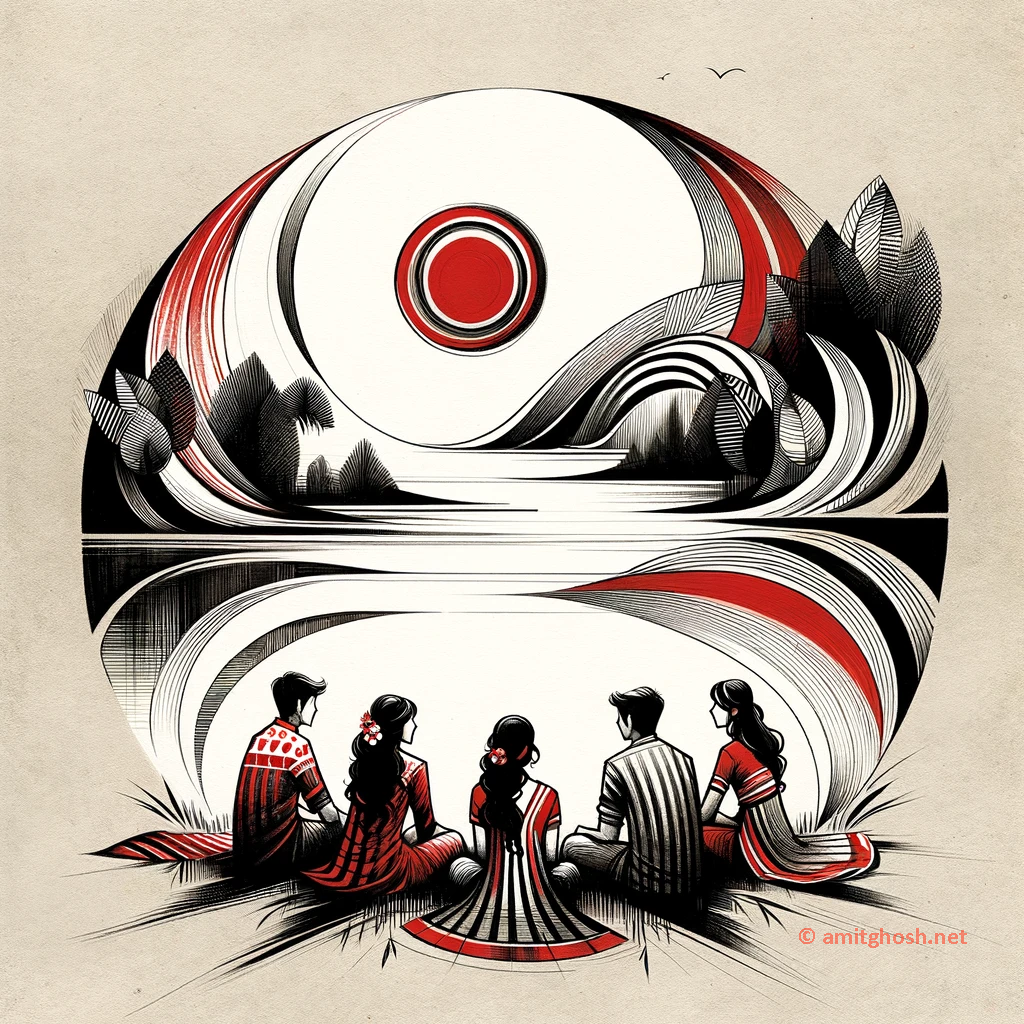
“Fine,” Bharati grumbled, her gaze dropping to the ground, a storm of emotions playing across her face.
The flour ball finally made its way into the pond, dissolving into a cloud of white that sent the fishes into a frenzy of delight. Laughter and chatter resumed, as the shadow of earlier tensions melted away into the warm embrace of the afternoon sun.
Confrontation
In a moment of haste and clouded by the tension at the pond, Bhargav’s concern for his own safety briefly overshadowed his better judgment. It was Jatayu’s sudden pinch, a gesture small but significant, that snapped him back to reality. Jatayu, ever the quiet observer, rarely spoke.
Gratitude washed over Bhargav as he glanced towards Usha, her figure framed against the backdrop of the serene pond, a stark contrast to Bharati’s looming figure. “Thank goodness Usha is here,” he thought to himself, a sigh of relief escaping him. In his mind, the threat of being pushed into the water by Bharati, in one of her unpredictable moods, receded. With Usha there, a gentle yet unwavering force, the balance shifted. Her presence alone seemed to diffuse the tension, serving as a silent reminder that kindness could bridge even the widest gaps between friends.
Well he and Jatayu would not have come here anyways unless Usha had asked them to come. He fears his mother but he is terrified of Bharati.
Bharati’s tale about the cat was a story shared in hushed tones among her friends, a memory that lingered like a shadow. One day, driven by a mix of curiosity and the thrill of the chase, Bharati stumbled upon a stray cat that had made a temporary home in the dense foliage near the pond. Intent on catching it for no reason other than to claim victory over a creature more elusive than herself, Bharati lunged. The cat, spurred by instinct and fear, lashed out in defense, leaving a set of sharp, stinging marks on Bharati’s arm.
Fueled by a mix of pain and wounded pride, Bharati’s determination turned to vengeance. Weeks later, when the cat had given birth to a litter of kittens, Bharati’s heart, instead of softening at the sight of the newborns, hardened. In an act that she later recounted with a chilling detachment, Bharati took one of the kittens, a tiny, mewling creature barely able to open its eyes, and buried it alive. She told her friends, expecting perhaps a shared sense of victory or understanding, only to be met with horrified silence and averted gazes.
She perceived her actions not as cruelty but as a victory, a way to assert her dominance in a world where she often felt sidelined. The consequences of Bharati’s behavior rippled far beyond the initial shock of her friends. The children in the neighborhood, already wary of Bharati’s unpredictable moods and imposing presence, now viewed her with a mix of fear and caution. Bharati, the girl who sought to command respect through intimidation, found herself more isolated than before.
The natural inhabitants of the area, the stray cats and dogs that roamed the streets and fields, seemed to sense this shift as well. Animals, intuitive and sensitive to the energies of those around them, began to steer clear of Bharati’s path. Where once they might have approached in curiosity or for a chance scrap of food, now they gave her a wide berth. It was as if her actions had sent a silent alarm through the web of life that connected every living creature in the neighborhood.
Bharati, with her imposing height and chubby physique, wielded her reputation as a bully like a weapon, striking fear into the hearts of the paathshala children with just a glance.
Although Bharati rarely showed affection, she held a soft spot for Usha, a girl known for her kindness and the peculiar habit of keeping a tiny piece of datura tucked behind her ear—a symbol, perhaps, of her ability to find beauty in the most unexpected places.
Alliance
Thirteen days ago…
An unexpected drama unfolded at the paathshala.
Bharati’s size often made her the target of mockery among her peers. One day, as she passed near the steps of the paathshala, a shove from behind sent her tumbling to the ground, her dignity bruised more than her knees. The fall was met with laughter, a cruel chorus that echoed off the school walls. But Usha, ever the defender of the downtrodden, sprang into action. Her voice, usually gentle, turned sharp as she scolded the crowd. “Are you people even human? This isn’t fair!” she exclaimed, her words cutting through the laughter like a knife.
Taking matters into her own hands, Usha confronted the boy responsible for Bharati’s fall, her anger manifesting in a swift retribution that left the instigator with more than just a bruised ego. The commotion attracted the teachers, and soon the entire affair was laid bare. The parents were called, and those who had mocked Bharati faced a scolding that would be remembered for many sunsets to come.
Bharati’s gaze was fixed on the new girl, an intriguing figure amidst the familiar backdrop.
There was something about her—a radiance, perhaps, or the quiet confidence with which she carried herself—that Bharati found captivating. Never before had she encountered someone like Usha, whose beauty seemed to draw the very light towards her, making the surroundings appear dull in comparison.
“Hi, I am Usha. My parents came from Nepal to settle and trade here,” Usha introduced herself, extending her hand with a gesture that bridged worlds and stories. Bharati, unsure yet compelled, took the offered hand, feeling a surprising strength emanate from Usha’s smaller frame. It was a strength that belied her delicate appearance, a contradiction that intrigued Bharati even further.
Since then, She declared Usha her best friend, a title she had never bestowed upon anyone else.
A noticeable change swept through the corridors of the Paathshala. It was as if a silent decree had been passed, a new rule that everyone quickly learned: Bharati, the girl whose name once echoed like a storm warning among the students, had transformed, but only under the watchful eyes of Usha.
When Usha was by her side, Bharati seemed to wear a different cloak.
This change was both visible and invisible. Visible, because everyone could see Bharati holding back the tide of her usual ways when Usha was near. Invisible, because the shadow of her old self lingered just out of sight, waiting for the moment Usha’s back was turned. It was in these hidden moments that the old Bharati reemerged, like a moon obscured by clouds, revealing itself only in the absence of the sun.
The students of the Paathshala quickly learned to navigate this new landscape.
Mystery
Seven days ago…
The Day of Makar Sankranti. Morning.
Usha looked up in the sky, her eyes wide with the anticipation of the coming rain. “It looks like it’s going to pour. Let’s stay indoors and find something fun to do,” Bharati suggested, her voice tinged with excitement.
As they stood up, their attention was abruptly drawn to the far side of the pond.
There, a mysterious cat with an intense gaze held their attention. It was an unusual sight – the cat seemed to have only one eye, the other possibly lost in some forgotten mishap. Bharati, moved by a sudden impulse, picked up a stone and, with a flick of her wrist, sent it skimming across the water toward the feline observer.
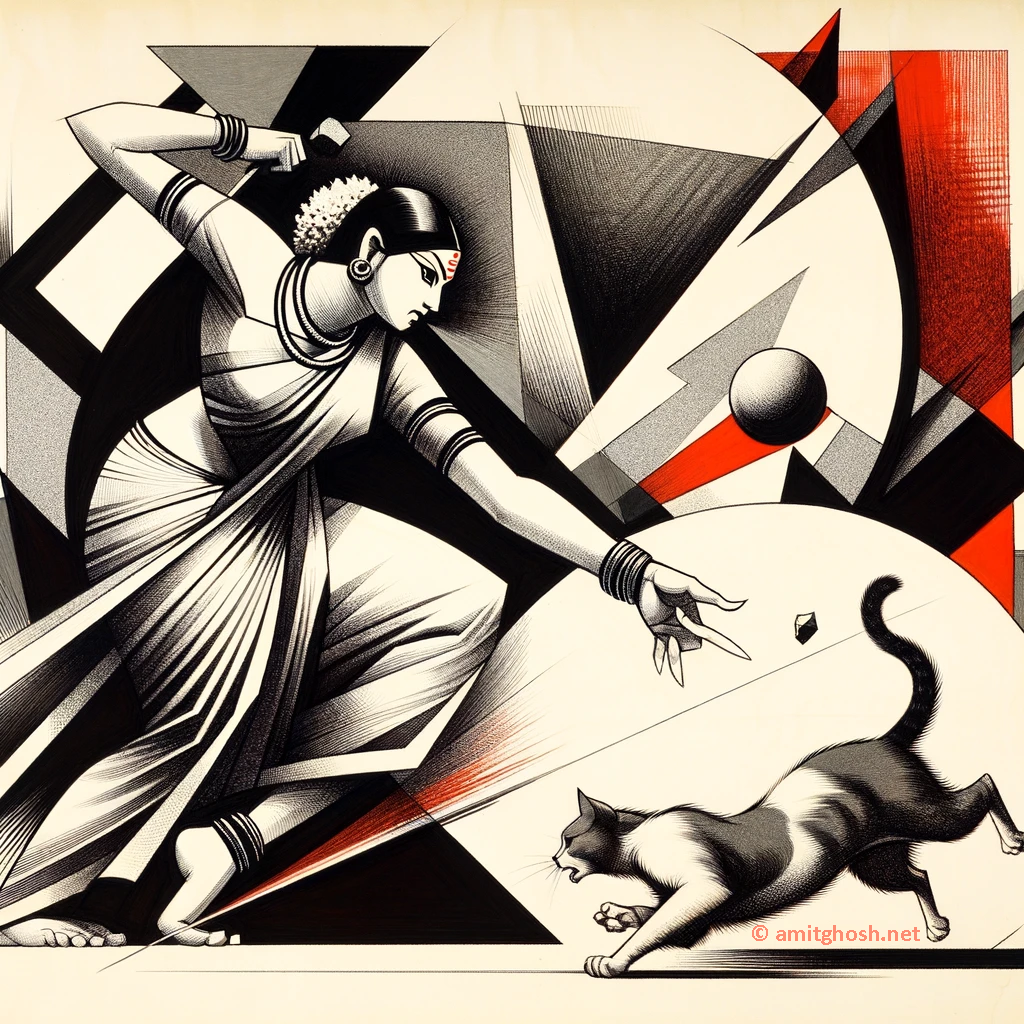
Bhargav and Jatayu call Ballavpara their home, a quaint village nestled on the far side of the Ganga. To reach their home, they must ferried across the river by Khedi.
“We really should get going,” Bhargav interrupted a sense of urgency in his voice.
Jatayu, who was known for his reserved nature, nodded in agreement. Without further ado, Bhargav and Jatayu started running to the banks of the Ganga, aware that the ferry would cease its runs at the first hint of rain, potentially stranding them for hours.
Their goal was clear: reach Khedi before the skies opened up. Time was of the essence.
Meanwhile, Bharati’s home buzzed with activity, a stark contrast to the looming quiet before the storm. The occasion of Makar Sankranti had brought guests aplenty, filling the house with laughter and conversation.
Bharati led Usha to the attic, a place teeming with memories and wisdom from the past.
“My grandfather used to retreat here, immersing himself in his studies,” Bharati shared as he opened the creaky windows, letting in a sliver of light that danced across the room filled with manuscripts and the lingering scent of ink – a smell that spoke of countless hours of scholarly pursuit.
The attic, once a sanctuary of knowledge, had seen little use since the grandfather’s passing. Bharati’s voice carried a hint of nostalgia as Usha’s eyes roamed over the manuscripts scattered around. Her love for reading ignited, and Usha was drawn to the manuscripts, eager to uncover the secrets they held.
However, their exploration was cut short. “Bharati, how much longer will you play? You need to practice your multiplication tables,” Bharati’s dad called out, her voice echoing up the stairwell.
“But Dad, it’s Makar Sankranti! Can’t I just play for today?” Bharati pleaded, her voice rich with the hope of a temporary reprieve.
Downstairs, Bharati’s father sighed. To him, discipline was paramount, even if it meant curtailing the festivities for Bharati. He couldn’t understand Bharati’s disregard for knowledge, nor did she share her disdain for the mundane tasks of daily life. In his frustration, he muttered, “This girl is a curse. How can she aspire to be a kabiraj?” His words, though whispered, carried the weight of his disappointment.
In a house divided by tradition and the pursuit of knowledge, Usha and Bharati found themselves at the crossroads of expectation and aspiration.
The rain began to whisper against the roof.
Usha’s world was one of endless stories and adventures, all held within the pages of her treasured books. Her friend Bharati often marveled at Usha’s passion for reading. Whether it was under the shade of an old banyan tree during their Paathshala breaks or nestled in a quiet corner of their home, Usha was always found with a book in her hands, her eyes dancing across the lines, and her mind exploring distant lands and times.
Bharati had noticed something else about Usha, too. Usha had a special notebook, its pages filled with her neat handwriting, where she scribbled down.
With a heavy sigh, Bharati whispered, “Yeah, we must have been born into the wrong family.
In a forgotten corner of the attic, shrouded in the mysteries of time, there sat an ancient box. Its surface was veiled in a tapestry of spider webs, a testament to its long neglect. Usha, her curiosity piqued by this relic of the past, approached it with a mix of reverence and excitement. With gentle hands, she lifted the lid, revealing the treasure within a collection of very old manuscripts, their pages yellowed by time but alive with the promise of untold stories.
A strong beam of sunlight, as if defying the rain’s command, found its way through the clouds, bathing the room in a surreal, warm light. This rare moment, when rain and sun graced the earth at the same time, was often said to be the time when foxes held their weddings.
“Bharati, come quick!” Usha called out, her voice echoing with urgency and excitement. Bharati, always ready for an adventure, rushed to Usha’s side. Together, they stood in the sunlit corner of the room, their eyes wide with wonder as they beheld the manuscripts. The pages, though delicate and worn, were beautifully inscribed in Devnagri Script.
“Wow, Sanskrit,” Usha whispered, her eyes sparkling with excitement.
“Yep. Grandpa was always buried in those old books, scribbling away. He loved Sanskrit. That’s the language all these ancient manuscripts are written in,” Bharati explained, spreading her hands wide as if to show the vast collection her grandfather left behind. She shrugged, a little sheepishly. “But, to be honest, it’s all Greek to me.”
“I understand it,” Usha said, her cheeks turning a soft shade of pink. She couldn’t help the smile that danced on her lips as she said those words. There was something magical about being able to connect with the past in such a direct way. She leaned closer to the manuscript on the table, her gaze fixed on the delicate, ancient script as if it held the secrets of the universe.
Bharati couldn’t hide his amazement. “You do? That’s incredible, Usha!” She looked at the manuscript with new eyes, wondering what secrets it held that only Usha could unlock.
Discovery
Three years ago…
It was a sunny afternoon, and Bharati was playing with her toys in the yard when she heard a noise that made her freeze. It was a sound filled with fear and pain, a sound that no one, especially not a young girl, should ever have to hear. She turned to see their family dog, Buno, a creature she had always seen as a gentle giant, attacking a stray cat. The scene was like something out of a nightmare, with the dog’s powerful jaws clamped down on the helpless cat, and the air filled with the cat’s desperate screeches.
The struggle was fierce and brutal, and it didn’t stop until all that was left of the cat was a lifeless, ragged lump of fur and meat. Bharati stood there, shocked and scared, her heart pounding in her chest. She didn’t understand why this had happened, why her beloved pet had turned into a monster right before her eyes.
Her dad, seeing the horror on her face, quickly came to her side.
Together, they decided to give the cat a proper burial in their backyard. They grabbed shovels and chose a spot under the old oak tree, a place that seemed fitting for a final resting place. As they dug the hole, Bharati, still trying to make sense of what she had seen, turned to her father and asked, “Dad, what did the cat do to deserve this?”
Her dad stopped digging for a moment, leaning on his shovel as he looked down at Bharati. The look in his eyes was sad but also filled with a kind of wisdom that comes from experiencing the world. “Well, Bharati,” he began, his voice gentle, “sometimes, no matter how well you think you’ve trained your pet, you can’t forget that at the end of the day, they are animals.
And animals can be brutal and cruel. It’s part of nature, a side of life that’s hard to understand sometimes.”
Bharati paused, letting her dad’s words sink in. She thought about the cat, the dog, and all the other animals she knew. They all seemed so different now like there was a hidden side to them she had never seen before.
Her gaze then drifted to the plot of land next to the hole they were digging for the cat. She noticed how the grass was already starting to grow over it, how soon it would look just like the rest of the yard as if nothing had ever happened there. It made her wonder about the stories hidden beneath the surface, stories of life and death, of love and loss.
“What happened to Mother?” she asked, her voice small. The question had been burning in her heart, a mystery she hadn’t been able to solve.
Her dad looked at her, a mix of surprise and sadness in his eyes. Then, with a sigh, he said, “Well, humans are animals too.”
He patted Bharati on the head, his hand lingering for a moment longer than usual.
Transformation
Seven days ago…
The Day of Makar Sankranti. Noon.
“It looks like your grandfather’s diary.”, Usha whispered.
Bharati had seen his grandfather’s handwriting! A series of inscrutable scribbles, more akin to ancient runes than any readable text. But this—this was different. It was as if the diary had been penned by a completely different person, or perhaps, in a moment of unparalleled clarity and skill.
“I always knew Grandpa had secrets,” Bharati said, a hint of awe in his voice. “But this… this is something else. It is not written by him at all. He wrote like ants. What do you think it’s about?”
Usha glanced up from the manuscript, her eyes alight with the thrill of discovery. “I think,” she began, her voice barely above a whisper, “it’s about a world we’ve never seen before. A world of ancient rituals and powerful magic. And look here,” she pointed to a passage on the page, “these instructions. They talk about rituals I’ve never even heard of.”
The pages were yellow and fragile, filled with secrets of the past, detailing rituals that seemed too magical to be real.
Bharati’s curiosity was piqued. “Can you understand all of it?” he asked, his voice tinged with both excitement and a slight envy of Usha’s ability to unravel the mysteries of the manuscript.
Usha nodded, her gaze returning to the diary. “Most of it, yes. It’s fascinating. There’s a ritual here,” she traced the lines of text with her finger, “that talks about swapping souls. Can you imagine? Actually stepping into someone else’s life?”
Bharati laughed, but the sound was hollow, betraying her nervousness at the idea. “Swap souls? That sounds… terrifying. And incredible. But mostly terrifying.”
Usha looked up, her expression serious. “It’s probably just a myth, right? Something from folklore or a fanciful story Grandpa wanted to remember.”
“Maybe,” Bharati replied, but she couldn’t shake off the feeling of wonder and a bit of fear. “But with Grandpa, you never know. He always had a way of making the impossible seem possible.”
As they pored over the diary, the room around them seemed to grow quieter, the air charged with the potential of uncovering ancient secrets. The possibility of adventure lay before them, nestled within the pages of a diary that bridged the gap between the past and their present.
Substitution
“Can you imagine swapping lives?” Bharati whispered, her eyes wide with a mix of fear and excitement. “Just for a week?”
Usha, always the more adventurous of the two, grinned. “Why not? It sounds like an adventure. I’ve always wondered what it would be like to be you, Bharati. To be fearless and carefree.”
“And I’ve always wondered what it’s like to be you, Usha. To be the star of the school,” Bharati replied, her voice tinged with a longing she couldn’t hide.
Usha and Bharati found themselves standing on the threshold of an experience that would forever change their lives. In the dimly lit attic of Bharati’s ancestral home, amidst relics and remnants of a bygone era, they prepared to undertake a ritual that seemed like something out of an ancient legend.
Usha, with a determination that belied her years, took charge of the preparations. Her hands moved with an uncanny precision as she retrieved an ink bottle. The glass shattered with a crisp sound, spilling dark ink onto the aged floorboards. With a piece of broken glass as her tool, Usha began to draw. The pattern emerged as if guided by an unseen force, intricate and geometric—a square bordered by circles, triangles, and more squares within, a design that seemed both complex and eerily familiar.
Bharati watched in silent awe, mesmerized by the transformation of the attic floor into a canvas of mystical symbols. “Have you done this before?” she asked, her voice barely above a whisper, as if afraid to break the spell.
Usha paused, a blush creeping over her cheeks. “No, not like this. But my grandmother taught me the art of alpana, to create patterns on the ground during festivals. We would go from house to house, creating beauty in exchange for alms. It’s how we made a living,” she explained, her voice tinged with a mix of pride and nostalgia.
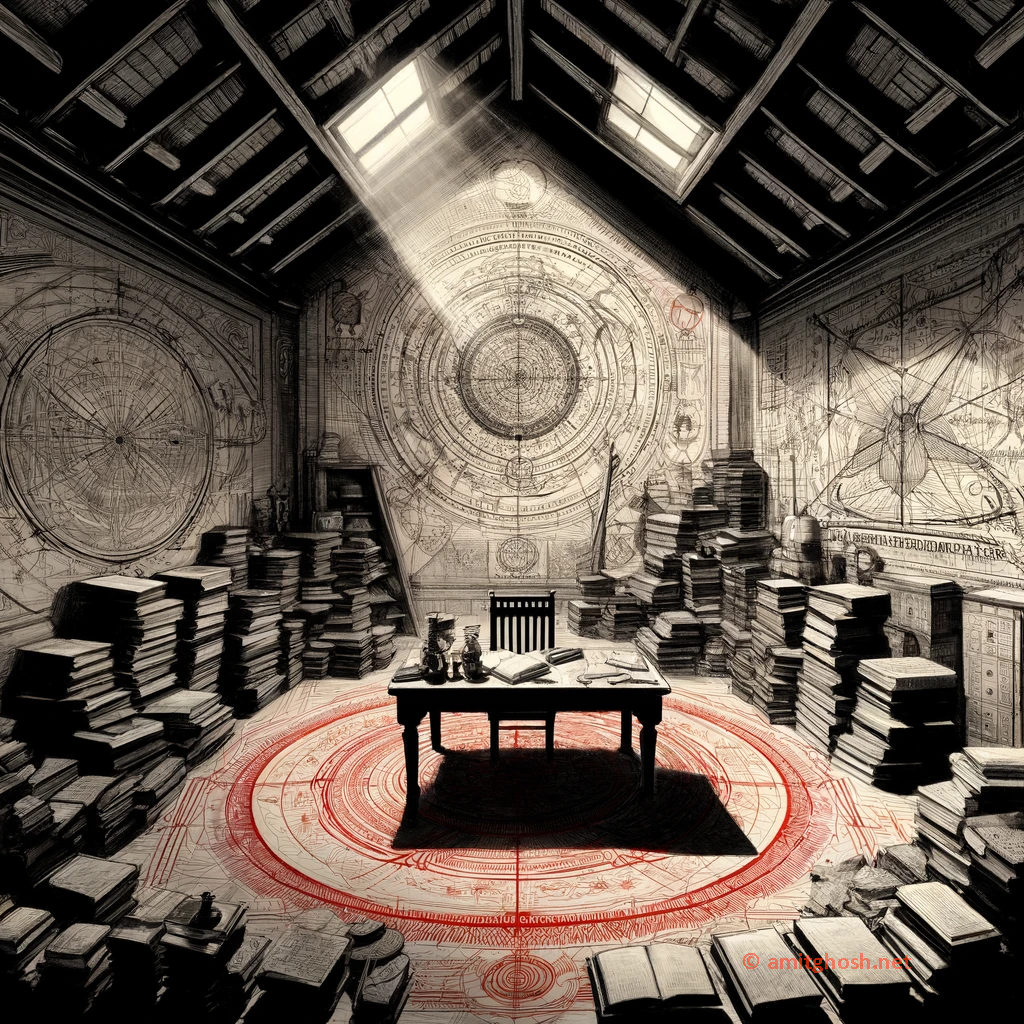
“Wow,” was all Bharati could manage, the simple word laden with admiration and wonder.
Usha, caught in the urgency of the moment, directed Bharati to fetch eight candles and a pouch of sesame seeds. Without a word, Bharati hurried downstairs, returning moments later with the requested items. Together, they set the candles at the cardinal points around the square and placed the sesame seeds within the central triangle, ensuring that each seed fell precisely where it was meant to.
“We must chant the mantra eight times with our eyes closed. And whatever happens, do not let go of my hand,” Usha instructed, her grip on Bharati’s hand firm and reassuring.
Bharati nodded, her heart pounding with anticipation and a hint of fear. They sat cross-legged, facing each other, their joined hands a symbol of their unity and shared courage.
As they chanted the ancient Sanskrit mantras, a gust of wind swirled around them, the candles flickering in the unseen breeze. The words felt strange, yet powerful, resonating in the attic space and within their very beings.
And then, silence.
Absence
Present Day…
Morning:
Where could she be? Bharati thought, worry gnawing at her. The plan was simple: meet before school, swap back, and return to their own lives. But Bharati, now living as Usha, had never been late. Not once. Bharati tried to calm her racing heart, telling herself there must be a reasonable explanation.
But as the clock ticked on, Bharati couldn’t shake the feeling that something had gone terribly wrong. Had Usha changed her mind? Or, worse, had something happened to her?
In the quiet that surrounded her, Bharati realized how much she had learned about Usha’s life—and her own. The adventure had started as a game, a chance to live out a fantasy. But now, faced with the possibility of being stuck in Usha’s life forever.
“Well, that will be amazing”, Bharati thought.
Bharati found herself enveloped in the warmth of Usha’s simple life. Each day unfolded like the petals of a morning bloom, revealing stories and wisdom passed down from Usha’s grandmother. This remarkable woman, whose heart and knowledge were as vast as the skies above, became a beacon of light in Bharati’s life.
Bharati had always felt like a shadow in her own home, invisible and unwanted. Her parents had longed for a son, a desire so consuming that it had led them down a dark path. Whispered conversations and hushed secrets revealed a chilling truth to Bharati — she was not the first daughter born to them, but rather, the survivor among her four sisters, whose lives were extinguished as swiftly as they began.
It was pure luck that Devadatta, the village head, and his companions, intervened at a pivotal moment, altering the course of Bharati’s fate.
A sigh of relief escaped her lips, a sound mingled with sorrow and gratitude.
“But where could Usha be?” Bharati wondered aloud, her concern deepening with each passing moment. Just yesterday, the two of them had shared a serene evening by the pond, their laughter echoing off the water’s surface. But today, Usha’s absence felt like a gaping hole in Bharati’s day. Unable to shake off her worry, Bharati made a decision.
With her heart pounding against her chest, she swiftly exited the classroom, the questions from her teacher fading into the background. The Paathsala suddenly felt suffocating. Determined, Bharati made her way through the bustling streets, her feet carrying her faster than they ever had before.
Her destination was the old house, the place that had once been her home. It now served as Usha’s home. As Bharati neared the familiar structure, a mix of anticipation and dread filled her. She hoped with all her heart to find Usha there. Yet, the fear of the unknown gnawed at her.
Look to your left, to your right, under your bed, behind your dresser, in your closet but never look up…She hates being seen.
Recurrence
Six Days ago…
One day after the Day of Makar Sankranti. Morning.
A performer, daring and bold, had fallen from an elephant while showing off his stunts at the village festival. The rain poured down like sheets of silver, soaking everything and making the night even more dramatic. Few villagers from there came in the midnight.
Bharati’s father, known for his healing skills, was called away.
When dawn broke, Bharati’s father returned, his clothes heavy with rainwater and his bag full of herbs and remedies. He went straight to the basement, his secret place filled with jars of herbs, roots, and mysterious powders. But today, something was different. Right in the middle of the basement stood a lone chair, as if waiting for someone to sit.
No matter how many times he moved it back to the corner, the chair seemed to have a mind of its own, always returning to the center of the room. It was as if the chair was playing a game, a mysterious and silent dance with him.
“Strange,” he muttered to himself, his brow furrowed in confusion.
Hearing the commotion, Bharati came running, her curiosity piqued. “Bharati, did you move this chair?” her father asked, his voice echoing with frustration through the basement.
“Chair?” Bharati replied, her voice a mix of innocence and confusion. She had no idea what her father was talking about.
Noon:
“No, this can’t be,” Bharati’s father exclaimed, trying to shake off the eerie feeling. “It must have been someone from the festival yesterday. Someone must have gone down there to rest maybe and left the chair behind,” he reasoned, hoping to find a logical explanation for the strange occurrence.
The house had been bustling with visitors during the Makar Sankranti festival, with people coming in and out.
Three Days ago…
Four days after the Day of Makar Sankranti. Night.
In the deep, silent hours of the night, Bharati’s father found himself restless, tossing and turning in his bed. The air was heavy and warm, a thick blanket of heat that made sleep a distant dream. The first hints of dawn were already painting the sky, a gentle glow that slipped through the window and into his room.
Trying to find a more comfortable position, he turned to his right. That’s when he saw it. A figure stood silently in front of him. His heart leapt to his throat, and a silent scream built up inside him, only to be stifled at the last moment.
“It can’t be. You are dead. It can’t be.” The words came like a whisper from his throat. His body instinctively prepared for a split-second decision—fight or flee—as adrenaline surged through his veins.
But then, a laugh, shaky and uncertain, escaped him.
It was just his chair, an innocent piece of furniture, draped in the clothes he had carelessly thrown on it earlier. But wait—wasn’t this very chair supposed to be in the basement?
The thought sent a fresh wave of panic through him, his heart racing, his chest tightening with the intensity of the shock.
Gradually, the grip of fear loosened, allowing him to catch his breath and settle his racing heart. As the adrenaline faded, exhaustion took over, lulling him into a fitful sleep despite the unease that lingered in the back of his mind.
But just as sleep claimed him, a cold, unmistakable touch grasped his foot. This time, there was no stopping the scream that tore from his throat, raw and filled with terror.
The night was no longer silent, and the darkness seemed alive with unseen threats. Bharati’s father lay wide awake, his mind racing with questions and fear. What was happening in their home? Was it simply his imagination, strained by the day’s events and the eerie incident with the chair, or was there something more, something darker at play?
Where is the chair? There is no chair!
The answers seemed to hide in the shadows, just out of reach, as the night stretched on.
“Father, what happened?” Bharati’s voice was urgent, filled with worry. “I heard you scream. Is everything alright?”
Bharati’s father sat up in bed, his heart still pounding from the shock. The room was bathed in the soft glow of the moonlight streaming through the window, casting long shadows across the floor. He blinked, trying to clear the fear from his mind as Bharati rushed in, her eyes wide with concern.
He took a deep breath, trying to calm his racing thoughts. “It’s… I thought something grabbed my foot,” he finally managed to say, his voice still shaky from the scare.
Bharati quickly scanned the room, her gaze landing on the empty space beside his bed. “But there’s nothing here, Father. Are you sure you weren’t dreaming?”
He shook his head, the image of the vanished chair flashing in his mind. “I was awake, Bharati. But it felt so real, and… the chair from the basement, it was here, in my room. Now it’s gone again.”
Bharati approached her father, sitting beside him on the bed. She reached out, taking his hand in hers, offering a comforting squeeze. “Let’s try to get some sleep now. We can figure this out in the morning. Maybe there’s a logical explanation for all of this.”
He nodded, though the unease still lingered. “You’re right. Let’s try to get some rest.”
A familiar, pungent smell filled the air, and Bharati’s father’s senses sharpened. The night, already heavy with mystery and fear, now took on a more sinister tone. He reached up, his fingers brushing against something unexpected on his pillow. Akanda flowers, with their pink and white hues, were scattered across it, their presence inexplicable and eerie.
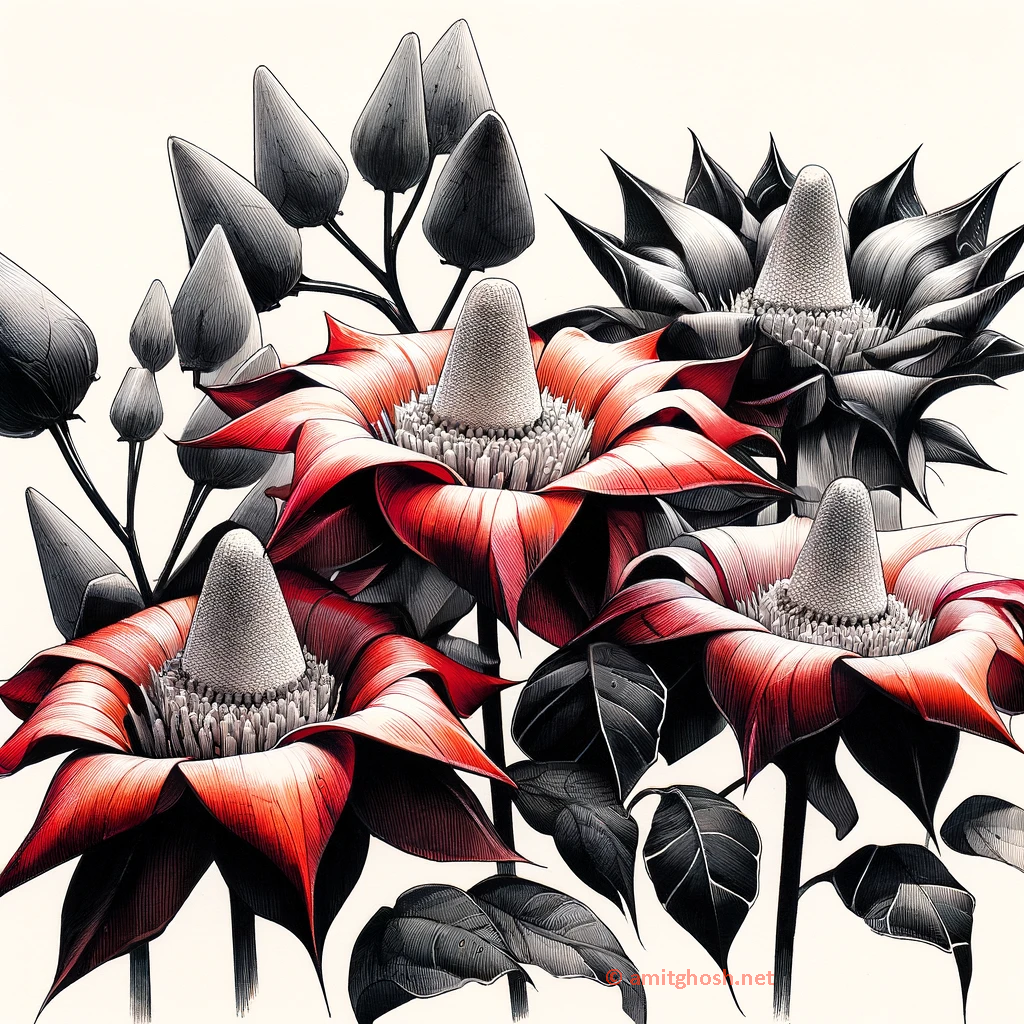
As the itching on his scalp intensified, Bharati’s father soon realized with a sinking heart that the sensation was spreading. Now, his hands began to itch as well, the skin reacting swiftly to the contact with the milky sap of the Akanda flowers. This physical response confirmed his worst fears: these were indeed the rare, dangerous species of Akanda known only to his tribe.
They are commonly known as milkweeds because of the white latex they produce. The white latex of Akanda Flowers has been used for wound healing, a fact well-known and cherished within his tribe for generations. However, hidden within this knowledge was a darker truth: a few of the rare species could cause severe, life-threatening fever and white blisters upon contact. This was a secret kept within the confines of his tribe, a guarded piece of wisdom that had been passed down through the ages, its dangers known only to those who shared his heritage.
But there was no one from his tribe in this village. They were all back in Nepal, living amidst the mountains and valleys that had cradled their ancestors for centuries.
Who put flowers in the middle of the night?
He did not see any flowers when he lay down in the bed!
“It can’t be,” he whispered in horror.
The touch of the flowers’ milky sap on his skin sent a shiver down his spine, not just from the physical sensation but from the flood of memories they unleashed.
Years ago, He had used these very flowers!
The details of that night came rushing back. Standing up in bed, sweat began to bead on his forehead, trickling down his face. The room felt colder now, the shadows darker. The air was thick with the scent of the Akanda flowers, enveloping him in a cloud of spine-chilling memories. He felt trapped, caught in the grip of his past actions and the horrible events of that night.
Remembrance
One Day ago…
Six days after the Day of Makar Sankranti. Morning.
In the warm, sunlit classroom of the paathsala, where the dust danced in the rays of light streaming through the windows, Prahlada Ranta, a master of the stars and numbers, was guiding his eager students through the mysteries of astronomy and mathematics. His voice, rich with knowledge, filled the room, weaving tales of distant planets and celestial bodies.
But not all were captivated by the cosmic ballet. Usha, with her head resting on the wooden desk, was drifting away into a world of dreams. Prahladji, noticing Usha’s slumber amidst his lecture, picked up a small chalk. With a flick of his wrist, he sent it arcing through the classroom, landing it gently on Usha’s desk with a soft tap. The sudden jolt startled Usha.
She sprang up like a jack-in-the-box, her voice echoing through the classroom, “I am present sir!” as if her name had just been called from a list of attendance register.
The room burst into laughter, the sound bubbling up like a fountain.
“In the ancient tales of the Brahma Vaivarta Purana, Sahasika, known as Bali’s grandson, interrupted sage Durvasa during a private moment with Tilottama. Angered, Durvasa transformed Sahasika into a donkey and cursed Tilottama to be reborn as Usha, the daughter of the demon king Banasura.” Prahladaji told with a smile. “Fatefully, Usha was destined to marry Aniruddha, Krishna’s grandson, intertwining their lives in a saga of divine retribution and destined love. But, our Usha sleeps!”
Usha’s face turned the color of ripe strawberries, a blush spreading from her cheeks to the tips of her ears. Her eyes scanned the room, landing on Bharati. Bharati was also smiling. Across the distance, their eyes met, bridging the space between them. They nodded at each other like it was the seal on their silent and wordless conversation.

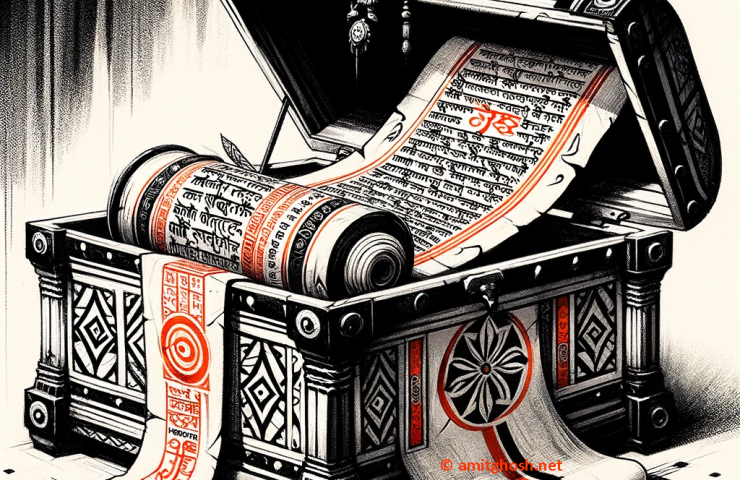
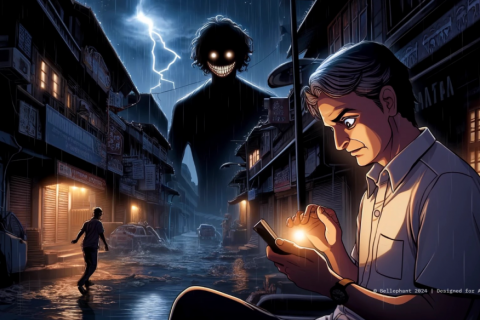
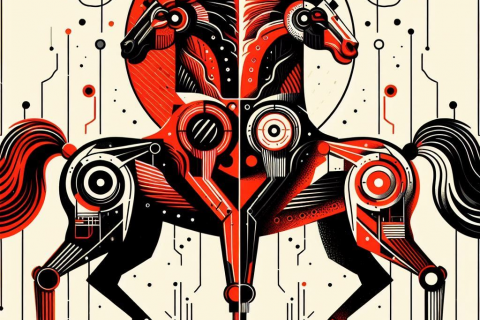








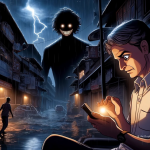

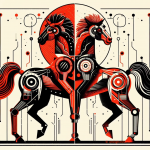
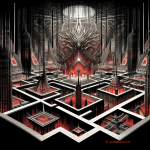
Leave a Reply